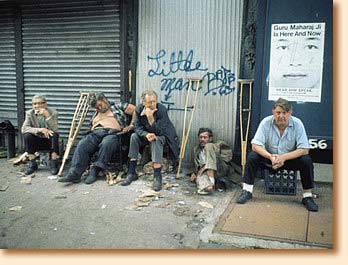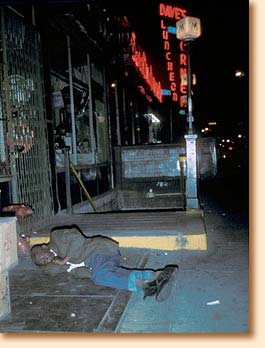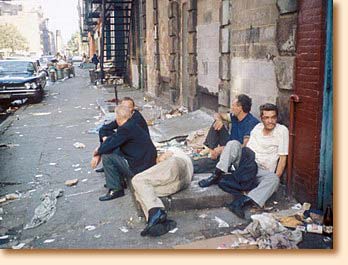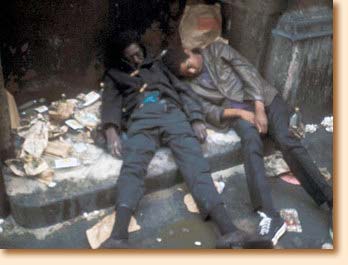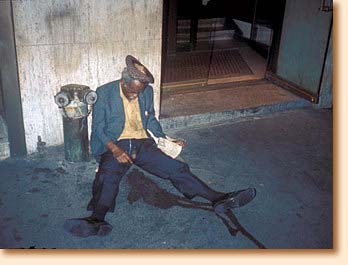
Book 9, pages 160-164
New York is an inhuman, cold city. You have to live with the alienation, or be destroyed. In my journey I always try to go the whole way with people I get attached to, but in New York again and again I must break off with people prematurely and thus abandon the human connection that has arisen between us. I have experienced it most strongly this Christmas, which was even more intense than last year when I was held up by three Puerto Ricans on Fourth Street on Christmas Eve.
This year I had just hitch-hiked in from Alabama, but couldn't
find any of my friends and ended up on the street down in the Bowery on
Christmas Eve. I got to talking with a bum who had lighted a fire to keep warm.
He must have been a bum for a long time, for his curly hair was all in knots
which could not possibly be combed out. We soon became good friends. He was one
of those bums who can talk; the worst are the bums who can only communicate
through the eyes.
As we were sitting there talking, it naturally occurred to us that it was Christmas Eve, and we became more and more sentimental, and when we exchanged memories of our childhood Christmas Eves it wasn't just the smoke from the fire which brought tears to our eyes. He had been married, had children, and had actually been quite happy, he thought now, but had suddenly become unemployed, after which his family started to disintegrate and he became an alcoholic. We sat and shared a flask and gradually became rather drunk. A crazy guy started throwing bottles at us which smashed against the wall next to us. At last it became too much for my friend and he took a piece of burning wood and beat the guy until he disappeared.
This happened around Delancey Street, where there is always a bunch of
prostitutes standing on the corner. Bums, just like other people, have a desire
to find somebody lower than themselves, and so during the course of our
conversation he kept returning to his indignation over these prostitutes who
were out even on Christmas Eve. Whenever I have drunk heavily with bums they
have fallen asleep first, even though we have been drinking the same amount.
And he, too, fell asleep, around ten or eleven p.m.
I wondered a bit whether I should stay and keep watch over him, since we had become good friends. I have so often seen poor black and Puerto Rican housewives with children and shopping bags walk over and trample on dead-drunk bums or kick them and afterwards quickly continue home to the pots and pans – a manifestation of their own self-hatred or lack of self-esteem. (In the same way I have often seen rich blacks of the "nouveau-riche" type – that frightening phenomenon we see everywhere in the Third World trample spiritually on the poor blacks left behind in the' ghetto.) But since the streets were rather empty that night I decided to leave him after having put a good load of scrap wood on the fire.
I wandered down to my favorite area around Avenue B (the "free-fire zone"), where there are always fights between the Puerto Ricans and the blacks, but which I like a lot because there is an almost even racial balance among whites, browns, and blacks. Here I saw Larry standing in a doorway. We started talking and he told me that he had just been thrown out by his white wife. When we realized we were in the same boat, we decided to go together to find a place to stay. First we bought a bottle of wine. Then we promised each other that if one of us found a place, he wouldn't take it without taking the other one with him. Larry was more extroverted and eloquent, but I was white, so we figured that what one of us didn't have, the other could make up for.
But Larry was the type who had to rap with everybody
in the street, no matter who they were. He had bee in a respectable marriage
for four years, but confided in me that the whole time he had really been a
street person at heart. So we had not walked far before we had a whole flock of
street people with us; most of them were bums. At one time there were five whom
Larry had promised that he would surely find them a place to stay and a bottle
of wine on top of that. Two of them walked on crutches. A third went around
flailing the air as if he were swatting mosquitoes.
I was absolutely convinced
that we could never find a place to sleep for this whole crowd, but since
something unexpected always turned up in such crazy situations, I didn't say
anything about it to Larry. We asked the few people we met if they knew of a
place we could stay, but concentrated first and foremost on the Jews, as the
others were celebrating Christmas, you see, and we therefore assumed that they
did not have room in their hearts. Since I was the only white, it was up to me
to handle this, while the others kept a bit in the background. But all efforts
were in vain. One person said that if it really was true that I was a foreigner
he would be glad to take me home, but he dared not, so instead he gave me six
dollars for the YMCA. Naturally we rushed off and bought a few bottles of apple
wine with the money, and from then on things looked a bit brighter. But we were
still unable to find any place to sleep, and the wine made the bums loud and
aggressive and the man swatting mosquitoes began shadowboxing at people, so that they fled in all
directions.
It was close to two o'clock when I was sent into the Broome Street Bar to find new "victims." As I checked out the crowd, a dark-haired woman came over to me and stood for a long time staring into my eyes in a strange way. Then she said very slowly: "You have fish eyes." I thought that she was on some drug and tried to keep from looking at her. Then she said, "I want you to come and live with me." I pulled myself together and asked if I could bring a couple of my friends with me. She said no. I said that then I couldn't come, but she nevertheless gave me her address.
I then went on with the others for another
couple of hours, but I couldn't get her out of my thoughts. The situation now
looked completely hopeless for us. We were really plastered by this time. Over
in the piles of corrugated cardboard on Mercer Street we had lost one of the
guys on crutches, who had fallen asleep. As it was now raining heavily and I
was almost unconscious, I slipped away from the others around five o'clock. I
was very embarrassed about it and during the next couple of days I felt very
ashamed. But a week later I was lucky enough to run into Larry on Washington
Square, and he told me that he, too, had left the others in the lurch and had
found a huge fat white woman over in the West Village, where he lived now. That
comforted me and we continued being good friends.
I myself had gone back to that strange woman. It turned out that she lived in a huge loft on Greene Street and had a studio on Broadway as big as a football field. Her bathtub was a little palette-shaped swimming pool. All she wanted from me was that I should keep her company. For three days we sat from dawn to dusk staring into each other's eyes. Everywhere there were huge plaster fish; they hung on the walls and gaped foolishly down at us. But there was certainly more life in them than there was in her. For three days I tried desperately to talk with her. All I managed to get out of her was that she felt very lonely and that she had never lived with a man before. She was forty years old, born in the ocean, and could only communicate with fish. She had nothing else to say. I was curious to find out who she was, so one night while she was asleep I searched through some of her papers and found out that she was the world-famous artist Marisol Escobar, who had twice been on the cover of Time Magazine and once on Look; but her last exhibition of fish sculptures had gotten bad reviews.
It turned out that she
was swimming in money. One day I had to sign as a witness on a contract for
several thousand dollars. Half the year she spent in the Gulf of Mexico diving
down to her little friends. Nevertheless, she never gave me so much as a piece
of bread, and I was getting more and more
desperate from hunger. Morning and night I had to follow her to restaurants and
sit across from her while she ate. The thought of giving me food never occurred
to her. As I never ask people for food, I one day came out with an indirect
hint.
"Did it ever occur to you that all your art is entirely for the rich
folks, and isn't benefiting the poor people at all?" No answer. And still no
food. She had a refrigerator, so at one point while she was asleep I took the
liberty of checking to see if there was any food in it. I got a bit of a shock
when several big cod-like frozen fish came tumbling out - and nothing else. If
I had not been so hungry, I would probably have had a bit more patience with
her.
Then suddenly came my rescuer wandering into this silence. It was Erica, who
had previously helped Marisol polish the fish sculptures. She was laughing and
happy, and it was fantastic to hear a human being again. She perceived my
situation quick as lightning, and as elegantly as a fish, seven dollars slipped
into my hand under the table. Later she whispered to me that I could move in
with her. When Marisol fell asleep that evening, I fled over to Erica, who
lives in a tiny miserable fire-escape apartment on 11th Street.
Erica, whom I am now living with, is quite simply a find. She is a lesbian, but does not have the feelings of hatred toward men that characterize so many New York lesbians. It always makes me so happy when I can have a good relationship with a lesbian woman. Erica, like me, can't understand the necessity of hating men. It's certainly true that both heterosexual and homosexual American men are alarmingly aggressive, but one must still try to understand the oppression and the society which created this John Wayne culture.
Black men, especially, suffer from this culture, partly because their mothers bring them up to it. (I always automatically wash the dishes in people's homes, but I have come to the point where I have stopped doing it in underclass homes because it usually embarrasses the women: they simply do not know what to do with a man who washes dishes. Is it not, then, wrong of me to try to change their culture when they will still have to live with the oppression?).
And ultimately white women have much the same attitude.
Time and again I am invited home by single white women, who unlike single women
in Europe almost always have a double bed and therefore put me at their side.
But what is shocking to see is how they are usually totally unable to deal with
a non-aggressive man. After two or three days they will often say something
like, "Have you always been homosexual?" to bring out some male
aggressiveness
in me, or more often, "Let's go out and get drunk." No doubt they would be a
bit uncomfortable if a new guest went right to their refrigerator and ate all
the meat. Yet American women seemingly feel uncomfortable if a man does not
walk right into their own flesh. With black women I sometimes find it
necessary to modify my passive rule about not violating people's hospitality
with some "affirmative action." They often do everything in their power to
humiliate a "soft" or non-aggressive man, which nips in the bud any chance of
building a more meaningful relationship with them.
Erica is a different woman. She has made me into the epitome of male
chauvinism: my function in her home is, in fact, to be a pimp. Erica is a
stylish prostitute - a call-girl - and it has now become my job to answer the
telephone, sort out the obscene calls and ask the nice ones to call again at 5
p.m. for a second sorting. She has an ad in the sex magazine Screw, which
apparently all businessmen read, for the telephone rings nonstop. The finals
start around 6 p.m. when I have to choose the very nicest voice and arrange a
meeting in a hotel for 7 p.m. We then take a taxi up to the hotel, which
usually is
on the East Side, as we stick to nice businessmen. My job is to sit in the
lobby drinking Coke for about an hour, and
if she has not come down by then, I have to go up and knock at the door.
On the way home we usually walk and eat Italian ice cream, which Erica loves. But the most fantastic thing about her is that she is not an average hooker. She just loves to help people and give them warmth in the midst of this coldness. She says that most of her customers are extremely lonely and have a need not so much for sex as for warmth. In fact, seen with typical male eyes, she is no physical beauty - abnormally thin, flat-chested, with curly red hair - but she has such charm and beauty inside, that these men can't resist her at all. Almost everyone gives her a hundred dollars, although we have only agreed on seventy-five, and only one has ever called and complained. She says that most often she doesn't even go to bed with them, but only gives them physical and especially spiritual massage. She has bought me many rolls of film, but for good reasons I have said no to money.
In the daytime she goes to singing lessons and dance classes or sits for hours making coffee services out of foam rubber. Every single cup, saucer, and spoon is perfect down to the smallest detail. She has several glass cupboards filled with foam rubber china, as in the most respectable bourgeois homes. She is a fantastic inspiration for me. One day when a man had been mugged outside on the street and had been left lying there for a long time, Erica was the only one who bothered to call an ambulance. But no ambulance came and people were just standing staring stupidly at the half-dead man. She kept telephoning. The thing is that there are only Puerto Ricans living there, so it usually takes up to an hour before police or ambulances arrive. Then she got the bright idea of calling the police and asking them to hurry over because there was a white man being attacked by several blacks and Puerto Ricans right outside; two police cars and an ambulance came immediately. This trick is common in New York, but it seems to work every time.
I have often seen Erica give a whole day's wages to people in need. She would bring it directly from the rich businessmen in the hotels to some beggar on the street. Another night she was even more fantastic. We were on our way to a movie when we saw a bum in his fifties sitting there asking for help to buy a bottle of wine, and for somebody to talk to. We sat and talked with him for a couple of hours over the wine, and he said that he was about to have delirium tremens and was afraid he would die. Erica immediately said that we would go with him to the hospital, and he cried for joy. He had been waiting for this moment for ten years. He had never himself had the courage to go to the hospital. We took him in a taxi to St. Vincent's Hospital. We sat in the waiting room for two hours. He cried the whole time. Then we were told that they would not accept him. He had been sitting there drinking and got absolutely impossible, screaming and yelling. I, too, shouted something about being from a civilized country with free hospital and health care for everybody. Then the police were called and we were thrown out in great style.
We took a cab to the emergency room at Bellevue Hospital and sat there with the
strangest people: screaming, hysterical, suicidal, and God knows what. We sat
there until six o'clock in the morning, but nothing happened. Meanwhile the man
drank his entire bottle and sat on the floor and cried with his head in Erica's
lap, while begging us not to leave him. Several times he urinated in his pants,
and a pool formed around him as he took his penis out and let it hang there.
Erica kept tucking it back in, but it kept coming out. Most of the patients had
by then fled out of the room. Then he began to vomit all over the place, the
most peculiar slimy and stinking puke I have seen in a long time. At that
point, even the two nurses fled. We tried to wipe it up. Around six o'clock we were
totally exhausted, and since the nurses solemnly promised that he would be
admitted to the hospital, we went home and slept.
Two days later I went to
Bellevue to visit him and give him some cigarettes. I was told that no one had
been admitted under that name. I was furious and sad and dared not tell Erica
about it at all. New York is a city which simply does not permit any human
being to be human. If you are to survive here you must learn to leave other
people to their fates. Erica, of course, is not from New York, so I will keep
living with her for a while longer. But soon I will go back to the warmth of
the South. New York's cold does me in every time.
Letter to an American friend
Copyright © 2005 AMERICAN PICTURES; All rights reserved.
